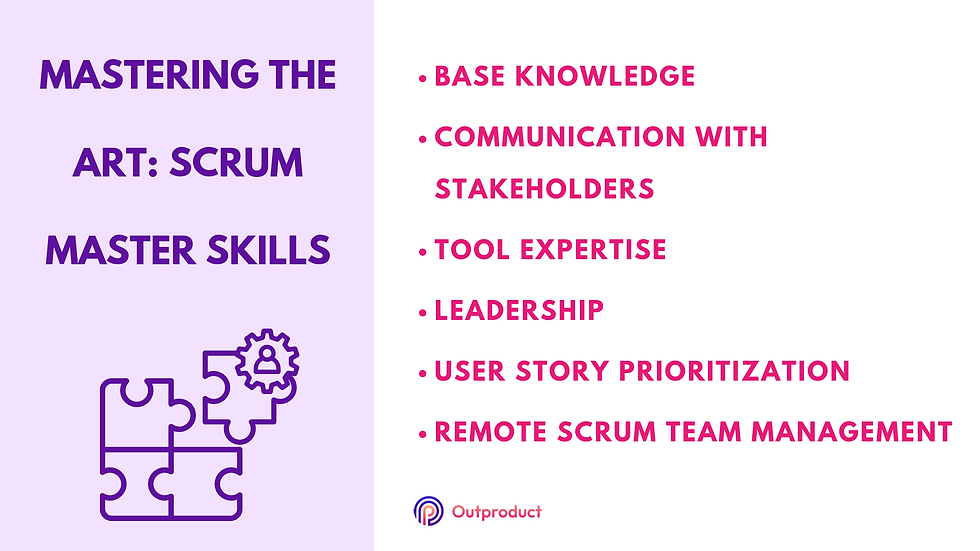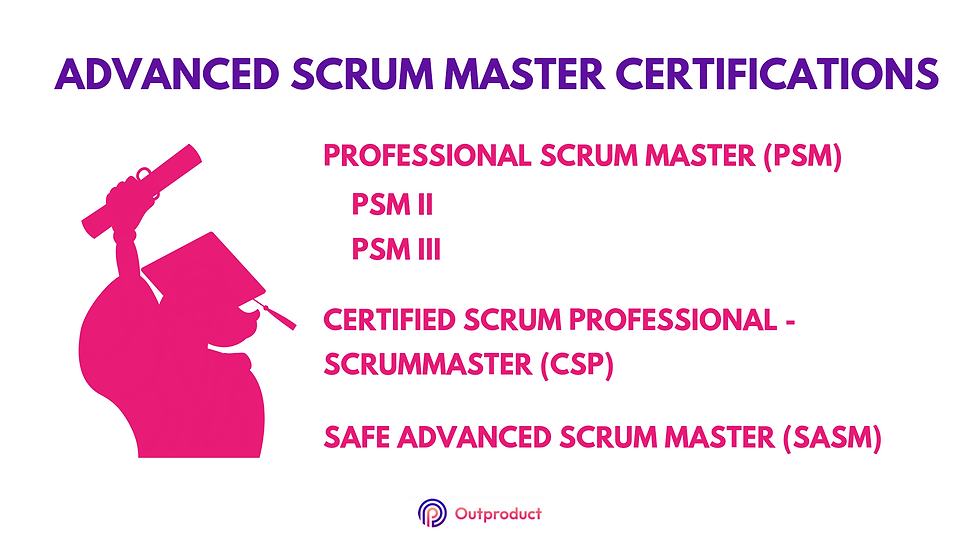The Scrum Master Role: Essential Skills Beyond Certification
- Conrad Rebello
- Jun 25, 2024
- 5 min read
Learn what a Scrum Master is and how they guide successful projects using Agile methodology.
Understand the different skills required to lead Scrum projects and manage them.
Unlock Advanced Scrum Expertise with the help of top recommended certifications in 2024.

What is a Scrum Master?
A Scrum Master is a person who is an agile coach for the Scrum team, entrusted with the responsibility to ensure successful implementation of the Scrum process for a given project. They act as a shield, deflecting distractions and protecting the team's focus on delivering value.
Scrum Framework: A Recipe for Agile Success

Born from Agile principles, Scrum is an agile project management framework which fosters continuous improvement through collaborative teamwork. Scrum methodology tackles projects in iterative bursts called sprints, typically lasting 1 to 4 weeks. It provides a clear framework for project management through the scrum team roles and responsibilities involved (Development Team, Product Owner, Scrum Master), the regular Scrum events that keep the project moving (Daily Scrum, Sprint Planning), and the Scrum artifacts that track progress (Product Backlog, Sprint Backlog). While organizations can adapt it to their specific needs, like team size or structure, it is important to maintain the core Scrum principles. Straying too far from these principles could mean the approach is no longer true to practices of Scrum and might not deliver the full benefits.
Mastering the Art: The Necessary Scrum Master Skills
This guide explores the key skills and competencies required to excel in this crucial Agile role.
Base knowledge:
Mastering Scrum requires a double dose of knowledge. Firstly, it involves a deep dive into the framework itself; mainly focusing on principle roles, events, and artifacts. But it doesn't end there. Fluency in agile and Scrum values like collaboration is key for good Scrum masters to guide teams and conquer complex projects. Continuous improvement becomes the mantra, with each sprint offering an opportunity to learn, adapt, and refine the approach.
Communication with Stakeholders:
While it may seem fundamental, communication stands as the most critical skill. Navigating the framework within the Scrum team requires interaction with a diverse range of stakeholders. Scrum Masters must not simply observe; they actively participate, fostering open communication and encouraging team members to do the same. This includes ensuring everyone attends daily Scrum meetings and understands their assigned tasks. Since Scrum work avoids micromanagement, a strong emphasis is placed on clear and consistent communication.
Tool Expertise:
Many organizations use project management tools for implementing the Scrum framework. When understood and used effectively, these tools can streamline workflows and improve communication. Scrum Masters need to be proficient in these tools to troubleshoot technical issues and guide the team to maximize their functionalities, leading to a more collaborative environment and ultimately success of the project.
Leadership:
While the role of the Scrum Master embodies servant leadership, prioritizing the team's needs for success, it shouldn't be mistaken for a lack of leadership entirely. Effective Scrum Masters tend to demonstrate leadership in crucial situations. They navigate external challenges like stakeholder disagreements and internal conflicts by facilitating solutions that don't hinder progress.
User Story Prioritization:
Scrum Masters are value conductors. They don't dictate user stories, but they facilitate workshops or meetings (often called backlog refinement) where the Product Owner and Development Team collaborate on them. This helps in ensuring the most impactful features are delivered first each sprint. This laser focus maximizes development ROI and keeps the product aligned with user needs and business goals.
Remote Scrum Team Management:
It is the Scrum Master's job to ensure all team members, regardless of location, feel heard and valued by actively listening and providing inputs. They leverage asynchronous communication tools (email, slack, project management software) to ensure a unified information flow across geographically distributed and co-located Scrum team members.

The Key to Success: Unlocking Scrum Mastery
While introductory concepts might offer a valuable foundation, the main emphasis is on the personal qualities that enable a Scrum Master to thrive in their role. This success hinges on a unique blend of adaptability, a growth mindset, and a willingness to embrace challenges. This section delves beyond technical knowledge, unpacking the intricate web of necessary skills that empower a Scrum Master.
Resourceful Navigators:
Unlike traditional project managers, Scrum Masters wield less direct authority. Their strength lies in their ability to navigate challenges with resourcefulness, finding creative solutions to overcome limitations. A resourceful Scrum Master isn't fazed by sudden absences of members of the Scrum team during critical sprints. They leverage the team's talent pool, adjust workloads, and might even seek external support – all to keep the project on track.
Feedback Fanatics:
Unlike some traditional management styles, Agile methodologies thrive on continuous learning. Scrum masters view constructive criticism as a chance to refine their approach, identify improvement areas, and ultimately, become better facilitators. This openness to feedback promotes a culture of growth within the team, where everyone feels comfortable sharing ideas and learning from one another.
Empathy Engineers:
Great Scrum Masters are more than just process experts. They excel at understanding human behaviour and connecting with team members on a personal level. This fosters trust, motivates individuals, and cultivates a positive team environment. By prioritizing empathy, they create a space where team members feel valued and heard, leading to a more engaged and productive team.
Advancing Your Expertise: A Guide to Advanced Scrum Master Certifications
Whether you're new to Scrum or an experienced Scrum Master, the Advanced Certified Scrum Master path offered by the Scrum Alliance takes your knowledge to the next level. The Certified Scrum Master (CSM) certification provides a foundational understanding of the Scrum framework, however, for experienced Scrum Masters that are trying to elevate their careers in agile, numerous specialized certifications are available. This list builds on the existing foundation and dives deeper into advanced practices. Led by certified Scrum trainers, it goes beyond the Scrum Guide to equip you with the latest Scrum master learning to secure a scrum master job.

Professional Scrum Master (PSM):
Offered by Scrum.org, the PSM track caters to experienced Scrum professionals. It comprises of two advanced levels:
PSM II:
This assessment validates a deeper comprehension of Scrum principles and their practical application in real-world scenarios. It is suitable for those who have already gained experience implementing Scrum within teams.
PSM III:
As the most advanced level within the PSM track, PSM III signifies mastery of Scrum. It assesses the ability to effectively apply Scrum principles across diverse team structures and organizational contexts. Holding PSM I and PSM II certifications is typically a prerequisite for this level.
Certified Scrum Professional - ScrumMaster (CSP):
The pinnacle of the Scrum Alliance product development, the CSP certification signifies the highest level of expertise to become a scrum master. This designation is reserved for highly experienced Scrum Masters who possess an existing Advanced Certified ScrumMaster credential and a minimum of two years of relevant work experience.
SAFe Advanced Scrum Master (SASM):
Offered by Scaled Agile Framework (SAFe), this certification builds upon the core Scrum framework by introducing concepts specifically designed to foster high-performing teams within large enterprises. To pursue this scrum certification, professionals are strongly encouraged to hold a pre-existing SAFe Scrum Master, CSM, or PSM credential.
In Conclusion
While a foundational overview to understand Scrum is essential, excelling in the Scrum Master role goes beyond certification. Successful Scrum Masters leverage this knowledge to cultivate a high-performing Agile team. They navigate the dynamics between all Scrum roles, particularly Scrum Masters and Product Owners, to ensure seamless collaboration. Although the framework provides a structure, it's the Scrum Master's ability to adapt and guide the team that unlocks the true potential of Agile.



Comments